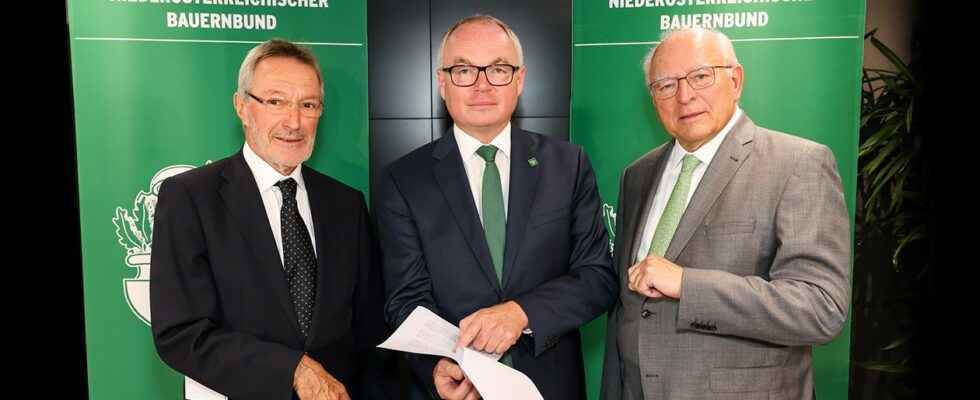At a press conference on Wednesday, the Lower Austrian Farmers’ Association, with its chairman and deputy governor Stephan Pernkopf, made a strong statement in the fight against the highly controversial Borealis deal for the fertilizer division. In addition to the blue and yellow state deputy, constitutional expert Heinz Mayer, who presented his legal opinion, and former top manager Claus Raidl, who appealed to ÖBAG’s responsibility, took a seat on the podium and expressly supported the concerns of the Lower Austrian Farmers’ Association.
More than three months ago, the OMV subsidiary Borealis announced the sale and the Czech Agrofert Group the purchase of the Borealis fertilizer division via press release. Stephan Pernkopf already asked in his first statement: “Where is the responsibility there? Farmers urgently need fertilizers for the production of food. How does ÖBAG intend to rule out a threat to our security of supply and empty shelves?” The Lower Austrian Farmers’ Association showed another threat scenario based on Germany. There, in the Piesteritz nitrogen plant, which is owned by Agrofert, the production of AdBlue, an important additive in transport, was stopped in addition to fertilizer production, provoking a considerable weakening of German economic output until a temporary solution was found these days. ÖBAG must protect Austria’s interests The legal opinion of constitutional expert Heinz Mayer, who described the deal as “constitutionally highly problematic”, was particularly concerned with the role of ÖBAG. Also in the basic idea of ÖBAG, which can be found in § 7 Para. 1 and Para. 2 of the ÖIAG Act 2000, “to take the business and research location and the safeguarding and creation of jobs into account” and “to ensure the influence to which it is entitled in existing investments and maintain it”, a clear obligation of ÖBAG and its executive bodies to take into account the security of the business location. According to Mayer, the deal contradicts this, since on the one hand the only significant fertilizer producer is lost and on the other hand the influence on the further development of the company is lost, with which “Austria cannot prevent any dependency on other countries and this can significantly endanger domestic production,” warns the constitutional expert en r water and food supply and research. With this provision, Austria is committed to “securing the supply of high-quality food of animal and plant origin, also from domestic production”, whereby, according to Mayer, ÖBAG, as owned by the federal government, is particularly bound to the provision and Austrian interests in the target has to be maintained. Concern about the impact on the business location Claus Raidl was particularly concerned about the impact on the business location and puts public interest ahead of business considerations: “This is certainly an isolated case, but in which individual economic optimization is reaching its limits and the public interest prevails. In this specific case, it is also justifiable from an entrepreneurial point of view to put the public interest before the maximization of individual profits. After all, not selling the division would not adversely affect Borealis’ earnings due to the good profitability of this division.” can also lead to foodstuffs. Lower Austria Farmers’ Association will continue to campaign for security of supply “The support of such outstanding figures in Austrian law and business shows that farmers are not alone in their concerns about the supply of fertilizers. On behalf of the Lower Austrian Farmers’ Association, the 37,000 family farms and to protect the security of supply for all Austrians, I ask those responsible at ÖBAG to call off this disastrous deal. Fertilizer production must remain red-white-red!” said Pernkopf, who finally confirmed that the Lower Austrian Farmers’ Association will continue to use all options to stop the sale of the Borealis fertilizer division. About the deal and the current situation around fertilizer production in EuropeIt is It is expected that the merger will result in a market share of the merged entity in the Austrian market for nitrate of calcamine KAS in the range of 70-80% or even more, which clearly represents a dominant position. The current second, third and fourth largest producers are either based in Russia or controlled by Russian companies, or based in Ukraine, namely Eurochem, Ostchem and Uralchem. As a result, the second, third and fourth largest manufacturers are currently subject to political sanctions or are even directly affected by military operations in Ukraine, which prevents them from accessing customers in the EU member states. However, the situation is also tense in the EU states. For example in the SKW (nitrogen plant) Piesteritz, which belongs to the Czech Agrofert group. The production of fertilizers and the additive AdBlue, which is important for traffic, was stopped there in August. Only after intensive negotiations on the part of German politicians was the plant put back into operation. The German media also published reports from the plant that give a deep insight, saying, among other things, “We have the feeling that the problem has been understood and trust in a reliable signal from politics”.
source site-12
